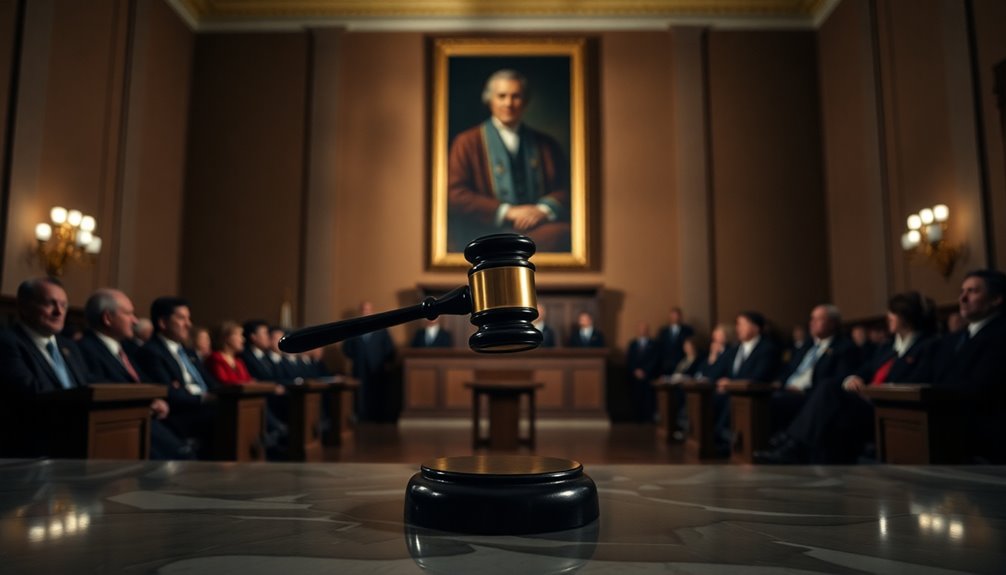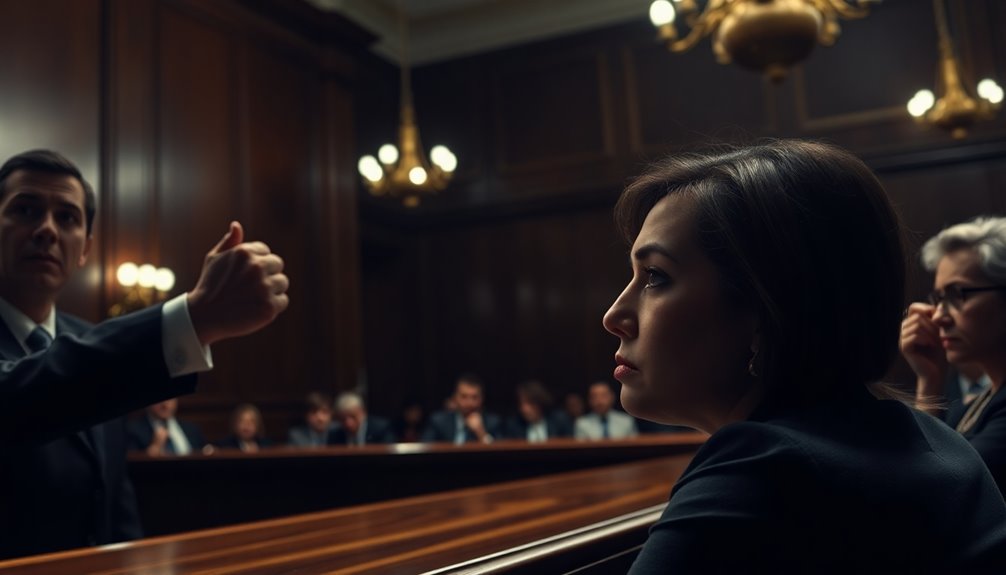The Adams case raises serious concerns about justice being influenced by political motives, especially under Trump's leadership. Allegations of political interference and the involvement of former Trump officials fuel skepticism. Critics highlight how the case was dismissed without substantial evidence, raising questions about integrity and impartiality within the Justice Department. These events not only reveal deep divisions but also risk eroding public trust in the justice system. Discover more about the implications of this troubling situation.
Key Takeaways
- The dismissal of charges against NYC Mayor Eric Adams raises concerns about potential political motivations influencing justice under Trump's administration.
- Allegations of a quid pro quo arrangement suggest political interference in the case, undermining the integrity of prosecutorial decisions.
- Internal conflicts within the Justice Department reflect significant divisions over the handling of the Adams case, compromising its independence.
- The involvement of former Trump lawyer Emil Bove in the case deepens suspicions of bias and politicization within the justice system.
- Critics argue that the swift dismissal of the case sets a dangerous precedent for future political interference in legal matters.

As concerns about the integrity of the justice system mount, the case against NYC Mayor Eric Adams has become a focal point for accusations of political interference. Several senior Justice Department officials resigned after being ordered to drop the case, highlighting a troubling trend in the politicization of justice. The involvement of the Trump administration, particularly through Deputy Attorney General Emil Bove, a former Trump lawyer, raises serious questions about whether political motives are undermining legal processes.
The reasons behind the case's dismissal suggest a transactional approach to justice, with implications that Adams was expected to support Trump's immigration policies in exchange for the case being dropped. This maneuvering has drawn harsh criticism from prosecutors like Danielle Sassoon, who emphasize the rapid and superficial decision-making in the process. Such handling not only reinforces perceptions of bias but also erodes trust in the justice system's impartiality. The resignations of senior Justice Department officials further underscore the unrest within the department regarding this case.
Internal conflicts within the Justice Department reveal deep divisions over the case, undermining the principle of prosecutorial independence. When officials who resisted pressure to drop the case faced severe career repercussions, including resignations and potential investigations, it became clear that the integrity of the department was at stake.
The actions taken suggest broader systemic changes in how justice is administered, possibly altering the structure and priorities of the system. Moreover, the ethical implications are significant. Allegations of quid pro quo arrangements between Adams' lawyers and the administration raise concerns about the motivations behind legal decisions.
The lack of substantial evidence for some charges, like destruction of evidence, further complicates the narrative. While prosecutors believe the charges against Adams have merit, the dismissal sets a dangerous precedent for future political interference in legal matters.
Frequently Asked Questions
What Are the Main Allegations in the Adams Case?
In the Adams case, you'll find several serious allegations.
He's facing bribery charges for accepting illegal campaign contributions and gifts from foreign nationals.
The case includes claims of campaign finance violations and soliciting foreign donations to obtain public funding.
Additionally, there are accusations of lobbying for government favors in exchange for these contributions and even ordering the destruction of documents relevant to the investigation.
These allegations paint a troubling picture of corruption and misconduct.
How Does This Case Compare to Previous Political Cases?
When it comes to political cases, the Adams case feels like déjà vu.
Just like previous instances, this situation highlights the blurred lines between justice and politics. In earlier cases, such as those involving Trump's DOJ actions or the SDNY's autonomy, pressures to conform to political agendas often emerged.
You’ll notice a pattern where allegations of bias and interference raise eyebrows, leading to skepticism about the integrity of the judicial process. These concerns often stem from high-profile cases or political figures, highlighting the delicate balance between justice and public perception. As the scrutiny intensifies, allegations can overshadow genuine legal issues, further complicating public trust. For instance, recent discussions surrounding senators’ votes on rfk jr nomination have sparked debates about potential influences that could undermine the credibility of the decision-making process.
What Are the Potential Outcomes of the Adams Case?
In the Adams case, you might see several potential outcomes. Charges could get dismissed, allowing for a possible re-filing later.
The judge holds the power to accept or reject this request. If new evidence surfaces, reopening the case is also an option.
Additionally, the dismissal could influence future legal standards and political dynamics, shaping how similar cases are approached and affecting public trust in the justice system moving forward.
Who Are the Key Figures Involved in the Adams Case?
In the Adams case, you'll find several key figures.
Danielle Sassoon, the interim U.S. Attorney, led the prosecution until she resigned over the decision to drop the case.
Eric Adams, New York City's mayor, faces corruption allegations.
Pam Bondi oversees the Justice Department's role, while Emil Bove directed the dismissal of the case.
Their actions reflect significant tensions within the Justice Department, highlighting the complexities surrounding this high-profile legal matter.
What Impact Could This Case Have on Future Elections?
This case could shape future elections by eroding public trust, deepening partisan divides, and raising concerns about election integrity.
You might see campaigns focusing on perceived injustices, using political interference as rallying points.
Expect candidates to stress judicial reform and election fairness in their messaging.
As media coverage amplifies these issues, voters will question candidate legitimacy, ensuring that legal processes are seen as impartial—and that could significantly influence voter turnout and engagement.
Conclusion
In the Adams case, you can see how the lines between justice and politics blur, especially under Trump's leadership. It raises a crucial question: if justice becomes a tool for political gain, who truly benefits? The truth is, when justice is politicized, it erodes public trust and undermines the very foundations of democracy. You must ask yourself—what does it mean for your rights and freedoms when justice is no longer blind, but driven by political motives?









